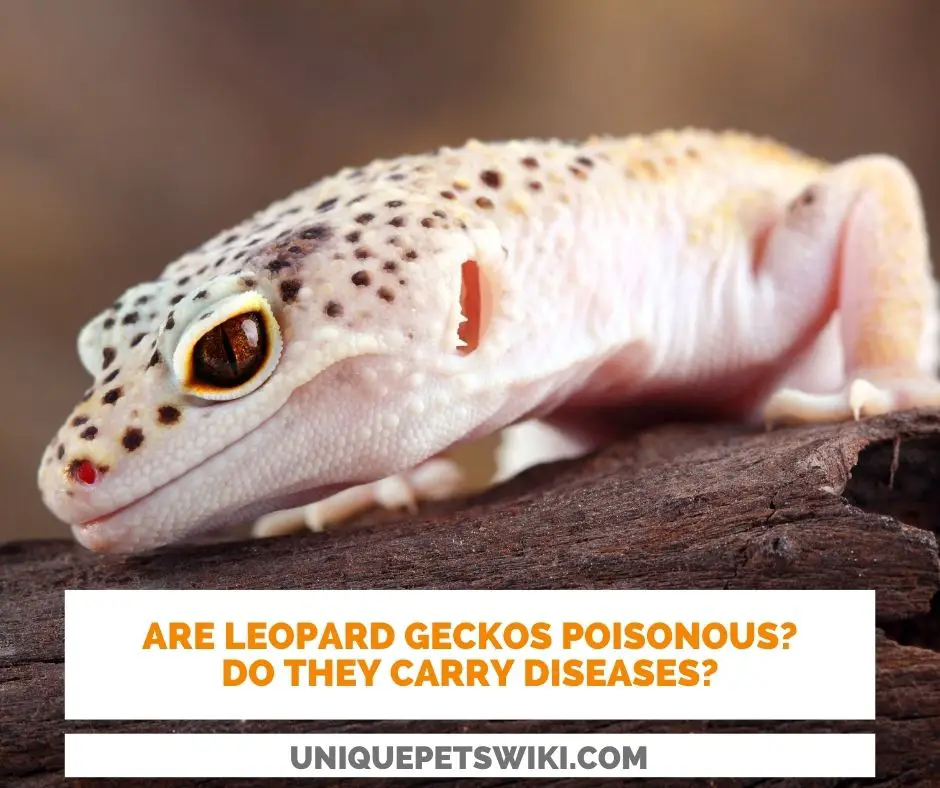Leopard geckos are a great pet and are suitable for beginner hobbyists. They are docile animals and will not bite their owners unless under abnormal conditions. However, it is understandable if you research and understand the risk associated with getting a gecko.
Leopard geckos are not a poisonous animal. This means you do not need to worry about venom in case your gecko mistakenly bites you. Leopard geckos have tiny teeth that will most likely not break through the skin, but if it does, you can simply wash the bite and treat it like any other cut.
In this article, we will talk about whether leopard geckos are poisonous, do they have teeth, are leopard geckos bites dangerous, and the reasons why leopard geckos can bite you.
Contents
Are leopard geckos poisonous?

No, leopard geckos are not poisonous or violent at all. You do not have to worry about any venom in case a leopard gecko bites you.
However, if you are accidentally bitten, and the bite breaks the skin, you can thoroughly wash the bite with soap and water and treat it like any other cut.
Leopard geckos are only aggressive when they are in defensive mode. But once they get used to them, you can easily handle them without any fear.
Are leopard gecko bites dangerous?

Leopard gecko bites do not really hurt like some larger reptiles. Although the bite may scare you, it is not a big deal. However, your gecko may never bite you if you socialize and handle them correctly.
Do leopard gecko have teeth?
Most geckos have a row of small, conical teeth that lines the premaxilla and maxillary bones on the upper jaw and dentary bone on the lower jaw. This shows that leopard geckos teeth are tiny and will not really inflict lots of damage to human skin.
Do leopard gecko bite hurt?
As stated in the sections above, leopard gecko bites are not dangerous. Although they bite down with as much force they can, it is not really a significant bite. However, there is a probability that you can get a bacterial infection from the bite.
This is why it is essential that you thoroughly wash the bitten area with antibacterial soap once you are bitten.
It may look logical to grab the gecko and remove it once you are bitten. This can be a worse idea because you can break and tear your skin and make the injury worse while trying to pull it away. However, the best thing to do is simply wait for your Leo to let go on its own.
Signs that your leopard gecko might be about to bite you
Here are some signs that indicate that your Leo may be plotting to bite you.
Your Leo is slyly hiding away.
If you notice that your gecko is hiding once you are around, it shows that it fears you and may bite you if you try to handle it. This is typical behavior of younger hatchlings or new geckos that is still getting to know you.
Your Gecko is swaying its tail aggressively
When a leopard gecko is swaying its tail aggressively, it indicates that it is getting defensive and can potentially bite you. You can easily notice this if your gecko sees itself in a mirror and mistake it for a potential predator or when it sees other animals like a house cat.
Your Leopard gecko is hissing aggressively
There are times when your leopard gecko will hiss at you once you approach it. This clearly shows that it is not happy with you and can bite you. Once you hear the hissing sound, it is best to think of it as a warning sign, and it is best not to handle them to avoid getting bitten.
Aggressive stance and posturing
Especially on cleaning days, you may notice that your gecko is pressing its stomach towards the ground and then follow your hand with focus. If you see this, this shows that it is unhappy and displaying its territorial behavior and can attempt to bite you.
Do leopard geckos carry any diseases?

All reptiles usually have a range of germs like bacteria, parasites, viruses, and worms in their body. However, they can easily transmit these germs to their owner. Some of the diseases are stated below.
Diseases that leopard gecko might carry
The most commonly found disease in all types of reptiles is the salmonella. It can easily be spread from reptiles to humans by eating something contaminated with reptile poop. Salmonella infection can lead to diarrhea, fever, headache, stomach cramps, and dehydration in humans.
Some of the other infections associated with keeping reptiles are campylobacteriosis (bowel infection), trichinellosis (disease of muscles, heart, lungs, and nervous system), and leptospirosis (liver disease)
However, keeping a leopard gecko does not pose a significant health risk if you can maintain proper hygiene. You need to ensure that you wash your hand thoroughly before and after handling a leopard gecko.
Wrapping Up
Leopard geckos are not dangerous or poisonous. They are docile animals and will only bite when they feel threatened or during abnormal situations. The best thing is that they have tiny teeth, and their bite is not as hurtful as other big reptiles out there.
